
"You Keep Me Hangin' On" is a song written and composed by Holland–Dozier–Holland. It was first recorded in 1966 by American Motown group the Supremes, reaching number one on the Billboard Hot 100. American rock band Vanilla Fudge released a cover version in June the following year, which reached number six on the Billboard Hot 100. Wilson Pickett recorded it in 1969. English singer Kim Wilde covered "You Keep Me Hangin' On" in 1986, reaching number one on the Billboard Hot 100 in June 1987. In the first 32 years of the Billboard Hot 100 rock era, "You Keep Me Hangin' On" became one of the six songs to reach number one by two different musical acts. In 1996, American country singer Reba McEntire's version reached number two on the US Billboard Hot Dance Club Play chart. The BBC ranked the Supremes' original song at number 78 on The Top 100 Digital Motown Chart, which ranks Motown releases by their all-time UK downloads and streams.
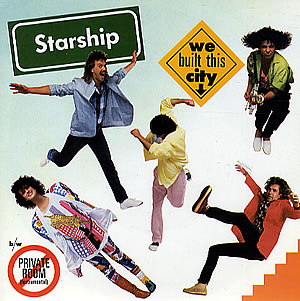
"We Built This City" is a 1985 song by American rock band Starship, the debut single from the album Knee Deep in the Hoopla. It was written by English musicians Martin Page and Bernie Taupin, who were both living in Los Angeles at the time, and was originally intended as a lament against the closure of many of that city's live music clubs.
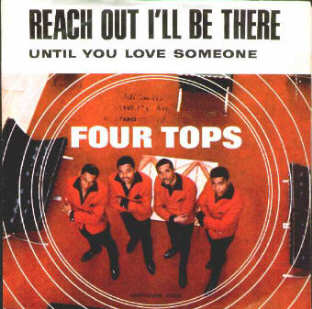
"Reach Out I'll Be There" (also formatted as "Reach Out (I'll Be There)") is a song recorded by the Four Tops from their fourth studio album Reach Out (1967). Written and produced by Motown's main production team, Holland–Dozier–Holland, the song is one of the most widely-known Motown hits of the 1960s and is today considered the Four Tops' signature song.
"Always on My Mind" is a ballad written by Wayne Carson, Johnny Christopher, and Mark James, first recorded by Brenda Lee and first released by Gwen McCrae in March 1972. Lee's version was released three months later in June 1972. The song has been a crossover hit, charting in both the country and western and pop categories. Elvis Presley's recording was the first commercially successful version of the song.

"Jive Talkin'" is a song by the Bee Gees, released as a single in May 1975 by RSO Records. This was the lead single from the album Main Course and hit number one on the Billboard Hot 100; it also reached the top-five on the UK Singles Chart in the middle of 1975. Largely recognised as the group's comeback song, it was their first US top-10 hit since "How Can You Mend a Broken Heart" (1971).
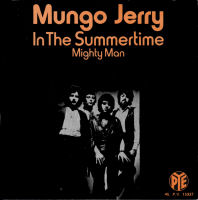
"In the Summertime", released in 1970, is the debut single by British rock band Mungo Jerry. It reached number one in charts around the world, including seven weeks on the UK Singles Chart, two weeks on one of the Canadian charts, and number three on the Billboard Hot 100 singles chart in the US. It became one of the best-selling singles of all-time, eventually selling 30 million copies. Written and composed by the band's lead singer, Ray Dorset, while working in a lab for Timex, the lyrics of the song celebrate the carefree days of summer. The track was included on the second album by the band, Electronically Tested, issued in March 1971.
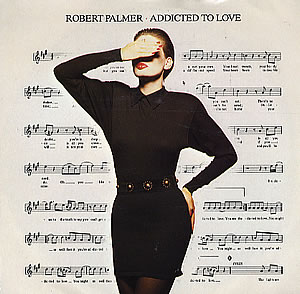
"Addicted to Love" is a song by English rock singer Robert Palmer released in 1986. It is the third song on Palmer's eighth studio album Riptide (1985) and was released as its second single. The single version is a shorter edit of the full-length album version.

"All Day and All of the Night" is a song by the English rock band the Kinks from 1964. Released as a single, it reached No. 2 in the UK on the Record Retailer chart and No. 7 on the US Billboard Hot 100 chart in 1965. The song was included on the Kinksize Hits EP in the UK and the Kinks' second American album, Kinks-Size (1965).
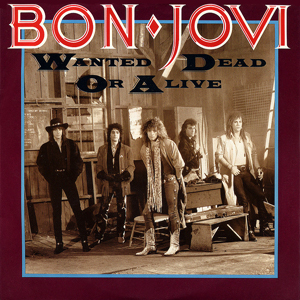
"Wanted Dead or Alive" is a power ballad by American rock band Bon Jovi. It is from their 1986 album Slippery When Wet. The song was written by Jon Bon Jovi and Richie Sambora and was released in 1987, as the album's third single. During a February 20, 2008 encore performance in Detroit, Jon Bon Jovi told the crowd about running into Bob Seger at a Pistons game. As he introduced his song "Wanted Dead or Alive", he said it was inspired by Seger's "Turn the Page" hit and called the song the band's anthem. The song peaked at number 7 on the Billboard Hot 100 chart and number 13 on the Mainstream Rock Tracks chart, making it the third single from the album to reach the Top 10 of the Hot 100. As a result, Slippery When Wet was the first glam metal album to have 3 top 10 hits on the Billboard Hot 100.
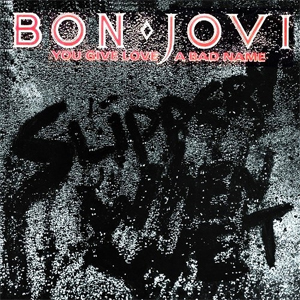
"You Give Love a Bad Name" is a song by American rock band Bon Jovi, released as the first single from their 1986 album Slippery When Wet. Written by Jon Bon Jovi, Richie Sambora, and Desmond Child about a woman who has jilted her lover, the song reached No. 1 on the U.S. Billboard Hot 100 on November 29, 1986, and became the band's first number-one hit. In 2007, the song re-entered the charts at No. 29 after Blake Lewis performed it on American Idol. Despite the lyrics of the chorus, the song should not be confused with "Shot Through the Heart", an unrelated song from Bon Jovi's 1984 self-titled debut album.

"Two of Hearts" is a song by American singer Stacey Q, first issued as an independent 12-inch dance club single by On the Spot Records, then picked up by Atlantic after achieving regional sales. Written by John Mitchell, the song was Stacey Q's biggest hit; its global sales success fueled the recording of her debut album Better Than Heaven (1986), which included the song.

"These Dreams" is a song by American rock band Heart from their 1985 self-titled eighth studio album Heart. It was released on January 18, 1986, as the album's third single, becoming the band's first song to top the Billboard Hot 100. The single's B-side track "Shell Shock", was also the B-side of Heart's previous single "Never".

"Who Will You Run To" is a song recorded by American rock band Heart. It was composed by Diane Warren and released as a single from Heart's ninth studio album, Bad Animals.

"Take Me Home Tonight" is a song by American rock singer Eddie Money. It was released in August 1986 as the lead single from his album Can't Hold Back. The song's chorus interpolates the Ronettes' 1963 hit "Be My Baby", with original vocalist Ronnie Spector providing uncredited vocals and reprising her role. Songwriting credit was given to Mike Leeson, Peter Vale, Ellie Greenwich, Phil Spector and Jeff Barry.
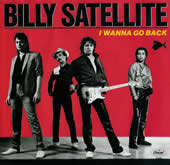
"I Wanna Go Back" is a 1984 song by American rock band Billy Satellite, written by band members Monty Byrom, Danny Chauncey, and Ira Walker, that achieved major popularity when recorded by Eddie Money in 1986. Another version was recorded by former Santana/Journey keyboardist/singer Gregg Rolie for his self-titled 1985 debut solo album.

"Endless Nights" is a song by American rock singer Eddie Money, released in 1987 as the third single from his sixth studio album, Can't Hold Back (1986). It was written by John Cesario, Michele Collyer and Steve Mullen, and was produced by Richie Zito and Money. It reached number 21 on the Billboard Hot 100 and number 10 on the Album Rock Tracks chart.

"Walk on Water" is a song by American rock singer Eddie Money from his album Nothing to Lose in 1988. Written by one-time Sammy Hagar keyboardist Jesse Harms, the tune was released as a single and reached number nine on the Billboard Hot 100 and number two on the Album Rock Tracks chart. Only managed to hit 128 in the UK. It also features a guitar solo from Jimmy Lyon, who had previously been a member of Eddie Money's band.

"Weak in the Presence of Beauty" is a song written by Michael Ward and Rob Clarke, and originally recorded by their band, Floy Joy. It was released in 1986 as the lead single from their album of the same name. In 1987, English singer Alison Moyet released a version of the song which was a hit across Europe and Australasia.

"Because" is a song recorded by English rock band The Dave Clark Five from their third studio album American Tour (1964). The song was produced by Adrian Clark, the song was originally the B-side to "Can't You See That She's Mine" in the UK.

"Should I Stay or Should I Go" is a song by English punk rock band the Clash from their album Combat Rock, written in 1981 and featuring Mick Jones on lead vocals. It was released in 1982 as a double A-sided single alongside "Straight to Hell", performing modestly on global music charts. In the United States, "Should I Stay or Should I Go" charted on the Billboard Hot 100 without reaching the top 40. The song received greater attention nearly a decade later as the result of an early-1990s Levi's jeans commercial, leading to the song's 1991 re-release, which topped the UK Singles Chart and reached the top 10 in New Zealand and many European charts. The song was listed in Rolling Stone's 500 Greatest Songs of All Time in 2004.



















